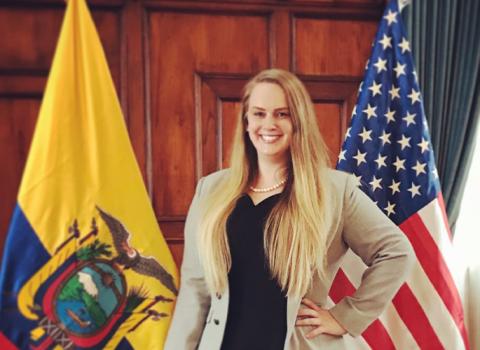Amanda Tollefson
Foreign Service Officer, U.S. Department of State
UW Majors: Spanish and Comparative History of Ideas
1. Tell us a bit about your job (e.g. what kinds of things you’re working on, what types of problems you solve day to day, etc.)?
As a Foreign Service Officer, I work to advance U.S. interests, protect American citizens, and facilitate travel for non-U.S. citizens. I've spent the majority of my career at U.S. embassies and consulates overseas, where each tour provides a varied work experience. In Mumbai, India, I adjudicated immigrant and nonimmigrant visas as well as provided passport, birth registration, and emergency services to U.S. citizens. In Quito, Ecuador, I spearheaded bilateral environmental conservation and natural disaster preparedness programs, as well as liaised with many U.S. and Ecuadorian government agencies to provide emergency support and relief during COVID.
Additionally, all Foreign Service Officers must speak a foreign language by their second overseas tour. If learning languages is something you enjoy, as I do, the Foreign Service provides unparalleled opportunities to continue learning them (I'm currently finishing a year-long, full-time Arabic course in preparation for my next tour, and also learned Hindi prior to working in India).
2. How do you think your humanities education has influenced/advanced your career path?
There is no aspect of diplomacy that isn't improved by a strong humanities background. CHID taught me to think critically, question everything, and look for unexpected answers. Studying abroad (whether through CHID, through the Honors program, or otherwise) cemented my desire to focus my studies on international themes. Majoring in Spanish showed me how languages both reflect and shape the worldview of their speakers, which led to a lifelong love of the culture, history, and politics of Spanish-speaking countries (including earning a Master's degree in Latin American and Caribbean Studies at NYU). Learning a global language like Spanish isn't just for those who want to become professional interpreters - it opens doors for careers ranging from business and education to law, medicine, and public service.
Foreign Service Officers are called "generalists" for a reason - a successful officer can quickly and thoroughly synthesize information from a variety of sources, taking historical and socioeconomic indicators into consideration, and produce well-written documents that inform policymaking at the highest levels. Diplomacy really comes down to being able to draw on a strong foundation of understanding the world's complexities, interconnected history, and human nature to best negotiate a mutually beneficial outcome - that is, exactly the same skills that are developed through a humanities-focused education.
You can also check out the profiles on the Alumni Spotlights page for more information on what our humanities majors are up to.
